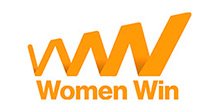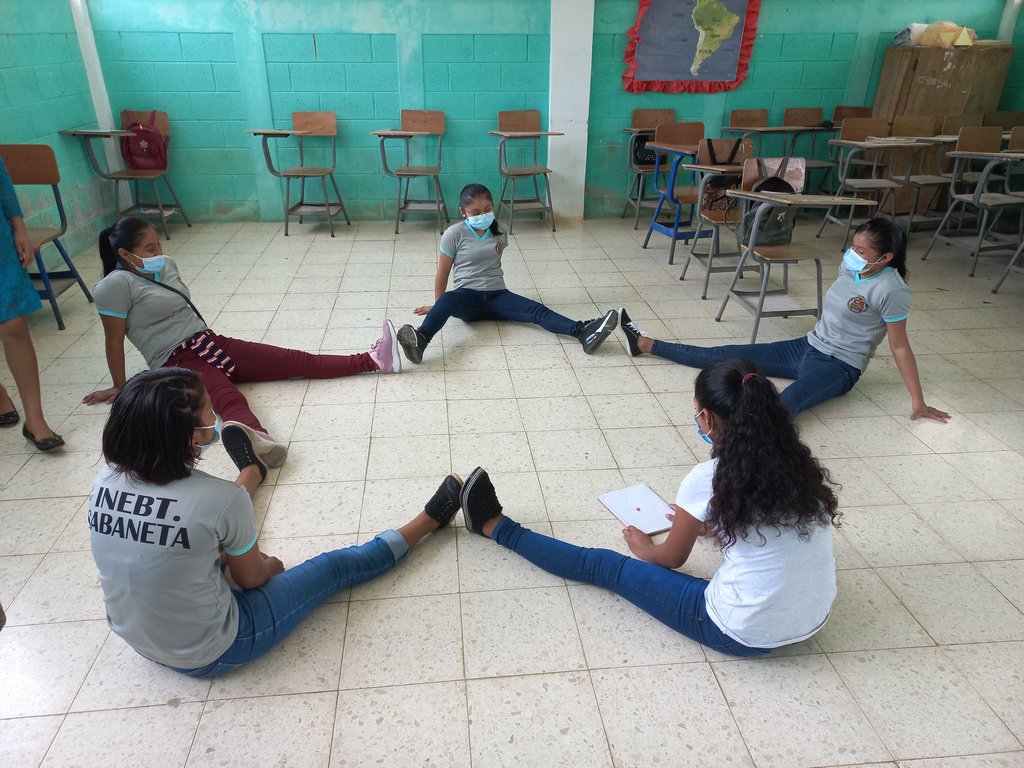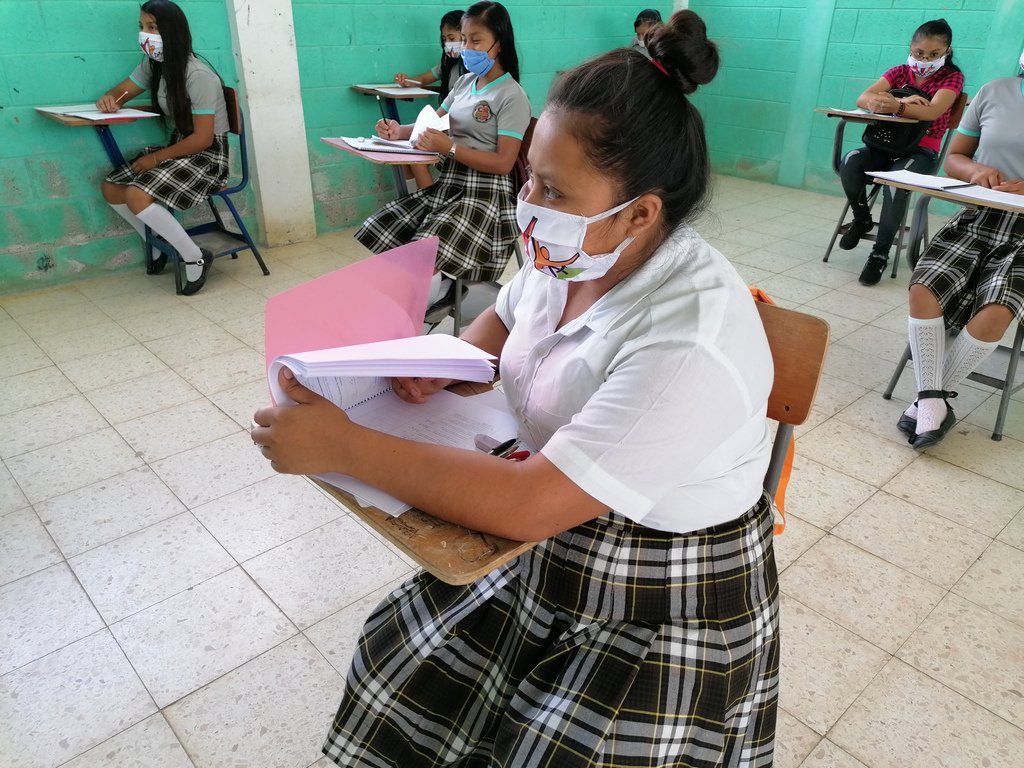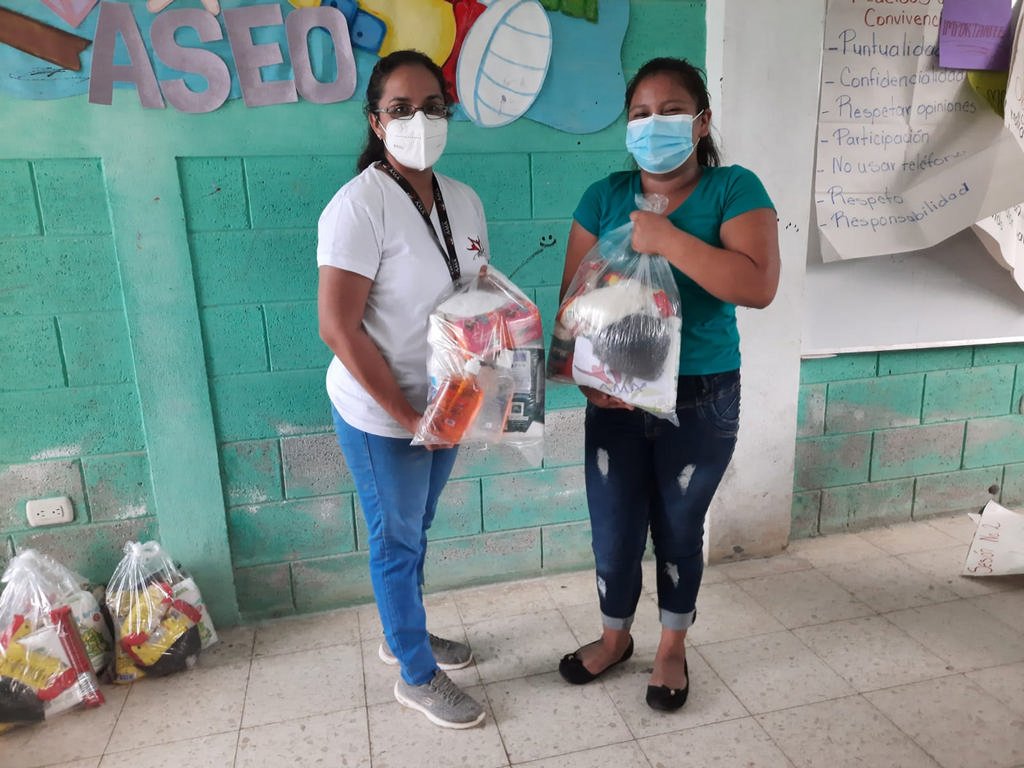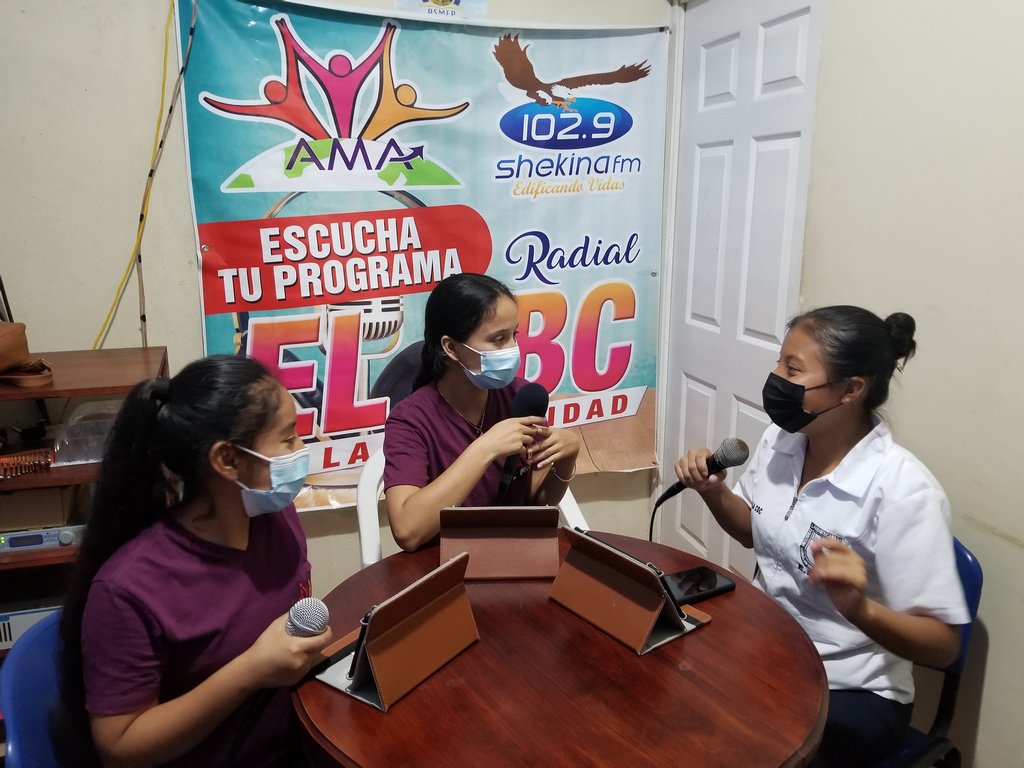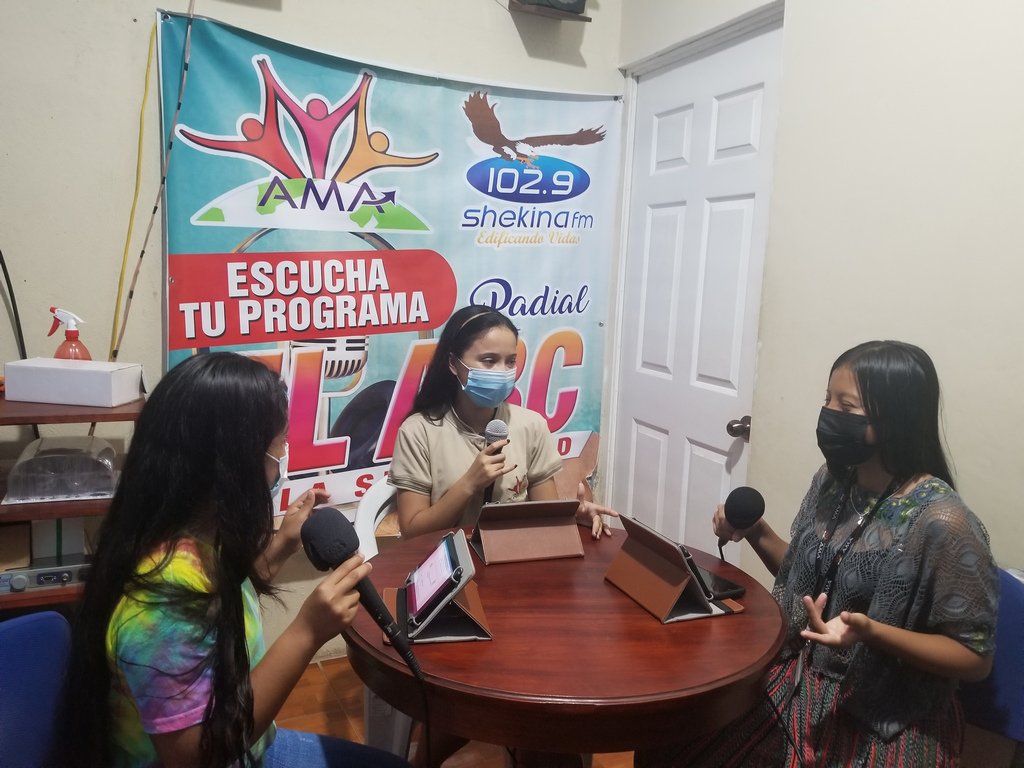
Project Name:
Personal Development and Professional Improvement Program (PACE Women) (2020-2021)
Start Date: May/2020
End Date: November/2021
42 young female volunteers
The "Personal Development & Professional Strengthening (PACE-Women)" program strengthened life skills development for young Maya Q’eqchí and Mestizo women from communities and marginal urban areas in Southern Petén.
Para ello, se implementaron círculos de formación interactiva con 42 mujeres jóvenes de los institutos de educación básica del caserío Sabaneta, Poptún y del barrio Nuevo el Carmen, Dolores, Petén, Guatemala, con quienes desarrollarán cuatro módulos acerca del programa PACE Mujeres, centrados en: 1) Comunicación; 2) Solución de problemas y toma de decisiones; 3) Manejo del tiempo y el estrés, y, 4) Salud Integral y 15 emisiones del programa de radio bilingüe “El ABC de la Sexualidad” transmitidos por la radio Shekina 102.9 FM y por Facebook Live en la fanpage de la Asociación AMA.
The program was developed to strengthen the teaching-learning process and safeguard the life and health of participants in the new reality imposed by the COVID-19 pandemic.
This program was carried out in partnership with the Departmental Directorate of Education (DIDEDUC) of Petén, Women Win, and the GAB Foundation. The PACE-Women program was conducted under a hybrid methodology, which combines face-to-face and remote work. In this sense, the following activities were carried out:
Activities 2020-2021
Three coordination meetings were held with the educational community of the two participating basic education institutes in the “Personal Development & Professional Strengthening (PACE-Women)" program from the Sabanera village, Poptún, and the Nuevo El Carmen neighborhood, Dolores, Petén.
In these meetings, directors, teachers, and parents were informed about the importance of the program, its content, the benefits of developing leadership and life skills, and that COVID-19 biosecurity protocols would be applied during its development.
During the meetings, teachers informed parents about the benefits of the program, stating that they followed up through the booklet and educational videos on the topics and could see a change in the participants, especially noting them being more participative, better communicators, which greatly helped them in their classes since distance education had been difficult for them, so they considered that they were learning better since the program started.
Mothers mentioned that their daughters talked about their rights as women, equal to men, giving them the right to choose whether to marry, have children, or continue studying, as well as the importance of preventing early pregnancies, as it is normal in their communities for girls to become pregnant or marry before the age of 18.
One mother said, "now my daughter doesn't think about getting married or going with a boy, because she's interested in continuing her studies and, if God permits, work and go to university to become a doctor and support girls and women in their health, so I thank the AMA Association for opening my daughter's eyes for the better."
It is of utmost importance to mention that coordination meetings were also held with officials from the Departmental Directorate of Education in Flores, Petén, and Coordinators of the School Districts in Poptún and Dolores, as their consent and involvement facilitate the participation of schools, and the program needs to be authorized by them in times of a pandemic.
In collaboration with Women Win, the booklet for the PACE Women program was designed, which was based on 4 modules of the program, focused on 1. Communication; 2. Problem-solving and decision-making; 3. Time and stress management, and 4. Comprehensive Health.
Once approved and bound, the booklets were delivered to the 42 young women participating in the program.
This greatly strengthened the teaching-learning process, as the participants had a working document through which they could reinforce the knowledge learned in the interactive training sessions at home, and the parents and teachers followed up on the content the girls received, so the knowledge reached family units and also served as a new source of information for teachers of the participating institutes.
16 interactive training circles were developed with the active and face-to-face participation of 42 young Maya Q’eqchí and Mestizo women from the basic education institutes in the Sabanera village, Poptún, and the Nuevo el Carmen neighborhood, Dolores, Petén, Guatemala.
The young women were divided into four groups, two groups per institute, to comply with the physical distancing protocols established by the Ministry of Education and Ministry of Health of Guatemala within the framework of COVID-19.
With each group, 8 interactive training sessions of four hours each were conducted, focused on the modules of the Personal Development & Professional Strengthening (PACE-Women) program.
The sessions were developed by two trainers and two Maya Q’eqchí and Mestizo assistants graduated from the PACE-Women program, who used an interactive-deductive "learning by doing" methodology, aiming to make the teaching-learning process practical, enjoyable, and to develop critical thinking in the participants.
Two deliveries of food supplies and hygiene kits were made to the 42 participating adolescent girls (one delivery per institute) to strengthen food security and nutrition, as well as menstrual hygiene and COVID-19 prevention for the adolescent girls and their families participating in the program.
Before the deliveries, the trainers reviewed the booklets to ensure that the participants were following the teaching-learning process from home, checking if they had completed the exercises from the topics and asking if they were doing the sports exercises.
In this review, it was noted that the participants were doing the exercises well. They also mentioned that they were doing the sports exercises at home, which they said were very beneficial, as they used them to exercise and relieve some of the stress caused by confinement.
The entry of Tropical Storms Eta and Iota added to the difficulties already faced by adolescent girls and women in Guatemala, which had been intensified by the COVID-19 pandemic, especially in rural communities and indigenous marginal urban areas living in poverty, such as the intervention communities.
Eight educational videos about the modules of the PACE Women program were made, through which the teaching-learning process of the practitioners, their families, and the rest of the students and teachers of the participating institutes was strengthened.
The videos were created by the program's trainers and were sent to the directors and teachers of the two institutes, who distributed them to the parents of the young women.
These videos were also sent by the teachers to the rest of the educational grades and then to the rest of the students, so the program has helped to strengthen the knowledge of more than 200 young people studying in the institutes.
The videos focused on the modules of the PACE program, which helped to strengthen and continue the process, and also engaged the participants and their families, as the videos were watched in family units.
The videos were also broadcast on the AMA Association's Facebook Fanpage and news pages like NotiSur, Publichal, Yo Soy de San Luis, Petén, Orgullo de Ser Poptuneco, and Noti Itzá, allowing more than 10,000 people, mostly young women, to watch and become sensitized with the videos.
To strengthen the process and continue it remotely, 15 broadcasts of the radio program were made through Shekina 102.9 FM community radio, each lasting one hour and carried out every 15 days, aligned with the development of the interactive training circles.
The programs were also broadcast via the AMA Association's Facebook Fanpage and news pages like NotiSur, Publichal, Yo Soy de San Luis Petén, Orgullo de Ser Poptuneco, and Noti Itzá, reaching more than 6,000 people, mostly young women. The programs were conducted as an open forum where the 42 young Maya Q’eqchí and Mestizo women from the two participating institutes and the rest of the community strengthened their leadership and life skills.
The programs were based on the modules of the Personal Development & Professional Strengthening (PACE-Women) program, developing three programs on the Communication module and four programs each on the modules of Problem-solving and decision-making; Time and stress management; and Comprehensive Health.
During each program, recommendations on COVID-19 biosecurity norms were given, such as washing hands correctly and constantly with soap and water or cleaning them with alcohol gel. The importance of vaccination was emphasized, and updates on vaccination locations and ages were shared.
To encourage communication, prizes were given to those who called into the program, consisting of balls and other gifts obtained from the Ministry of Culture and Sports and private companies.
The programs were conducted by three Maya Q’eqchí and Mestizo broadcasters from AMA, who are graduates of the PACE-Women program, making the transmission of content even more effective.
It is important to mention that young women in Southern Petén are familiar with using the radio, so it was not a significant effort for them to continue the process through the radio. In rural homes and marginal urban areas living in poverty, at least one radio transmitter is available, as the radio represents their only or main means of communication.
It is noteworthy that through the program, the Leadership Paths program was strengthened, as through it, a young woman joined the team of broadcasters, initially as a guest on the programs, and then, due to her interest, ease of speech, and leadership, she fully joined the program and is now part of the AMA broadcaster staff.
This opportunity, in addition to strengthening her leadership, provided her with economic income, as she receives a stipend of Q100 for each radio program, which has helped her to continue her studies and economically support her family, living in poverty.
Within the framework of the PACE Women program, a video festival was held, also aimed at strengthening the Leadership Paths program. The festival involved the girls recording a video discussing a topic from the workbook that they felt comfortable with and considered themselves knowledgeable about.
The festival also assessed the degree of empowerment the participants had gained throughout the process and served to motivate them to demonstrate to themselves that they are capable of accomplishing the activities they set out to do.
Initially, the girls were fearful of being in front of the camera, so they proposed practicing during the session and self-assessed what they needed to improve. After receiving all the videos, increased confidence in front of the camera, clarity in presentation, and naturalness in relating the topic to personal experience were noted.
Nine girls participated with a video, discussing various topics addressed in the interactive training circles and workbooks. Each video lasted 2 to 3 minutes and was done creatively, motivating their imagination and developing new skills, such as video editing on their phones.
The top three videos were awarded, judged by the 42 program participants, facilitators, and AMA management. The first place received Q300, the second Q200, and the third Q100.
The prizes were given in cash at the participants' request, as they expressed that they could use it to buy something for themselves, with some mentioning that they could buy school supplies, food, or clothing, considering the precarious economic situations of their families. Diplomas of participation were awarded to all nine participants.
Comics on Anxiety and Stress and Maria and Menstruation were bound by the AMA Association team and then distributed to the 42 young women participating in the PACE Women program. This significantly strengthened the teaching-learning process.
The comics were well received by the participants, who were observed reading them before the sessions and in their free time, discussing the contents among themselves, and consulting with the trainers about the content and whether they could share it with their siblings and friends at home and in the neighborhoods. The comics were undoubtedly of interest, pleasure, and liked very much by the adolescent girls.
Results Achieved 2020-2021
- Interactive Training Circles
42 indigenous and mestizo young women from basic education institutes in Sabanera village, Poptún, and Nuevo el Carmen neighborhood, Dolores, Petén, Guatemala. - Educational Videos
200 young male and female students from the two participating institutes, who received the educational videos on life skills. - 15 Bilingual Spanish-Maya Q’eqchí Radio Programs "The ABC of Sexuality"
6,000 adolescent girls and young women from communities and marginal urban areas in Southern Petén, listeners and connected to the program via radio and Facebook Live.
- Food Supplies and Hygiene Kit Delivery
The indirect beneficiaries are the 42 families of the indigenous and mestizo young women who participated in the program, who benefited from the delivery of basic food supplies and personal hygiene items given to the participants.
Volunteering:
42 indigenous and mestizo young women from basic education institutes in Sabanera village, Poptún, and Nuevo el Carmen neighborhood, Dolores, Petén, Guatemala.
After conducting the systematization process of pre- and post-test questionnaires, improvement in the girls' knowledge can be reflected in percentage terms. At the start of the program, the pre-tests showed a 56.63% knowledge of life skills and girls' rights. After completing the program, the post-tests reflected a 94.09% knowledge of life skills and girls' rights.
After conducting the systematization process of pre- and post-test questionnaires, improvement in the girls' knowledge can be reflected in percentage terms. At the start of the program, the pre-tests showed a 56.63% knowledge of life skills and girls' rights. After completing the program, the post-tests reflected a 94.09% knowledge of life skills and girls' rights.
PACE Women program trainers have shown significant growth in handling the program methodologies, incorporating the recording of 8 educational videos into the process.
The development of these methodologies has increased their leadership skills, confidence, expression, and innovative abilities regarding methodologies that can be easily adapted to the context.
Positive changes were observed in the participants during the PACE Women program. Initially, in the first circles, they appeared shy and insecure about responding or participating. However, as they progressed through the modules, they learned more about communication, problem-solving, stress management, the importance of time management, and the importance of taking care of their bodies and health as women.
It was evident that they learned to communicate better, as the participants are basic education level students who met each other during the circles due to irregular pandemic schooling. Initially, communication among them was scarce, but this gradually changed.
Before, the girls did not express their opinions, thinking they might be incorrect. After learning about communication, they became more participative during the circles.
One observed change was better time management; initially, they said they had no time to advance in their workbooks, but later, they organized themselves to complete school tasks, work on the workbook, and also dedicate time to themselves.
When addressing the Problem-solving and Decision-making module, the girls began to share the various problems they faced in their community. In their workbook, they found steps for problem-solving and noted alternatives.
One girl mentioned a problem at home with her brothers not helping to keep the house and yard clean. She decided to hold a family meeting to reach an agreement for everyone to contribute, leaving things in their place. This meeting yielded good results, with an agreement on where to place each item, like a designated place for machetes and tools and another for dirty clothes.
Another change observed in the participants is that they now take more care of their health and nutrition, opting for healthier eating options instead of junk food.
They also shared their doubts about menstrual periods and pregnancy. They assured that their decisions would now be based on the information received.
The donor who funded this project
